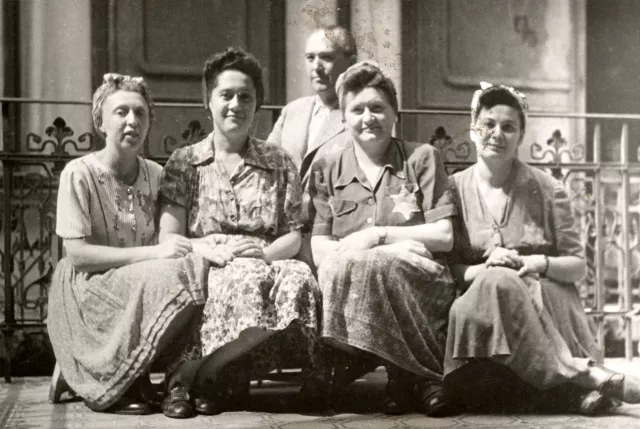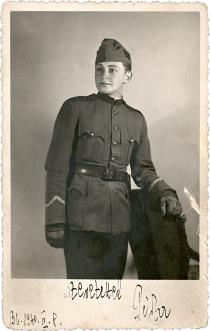Hedvig Endrei in the yellow star house on 14 Karoly Boulevard
This picture was taken in Budapest in 1944 when they ordered the wearing of the yellow star. The man standing behind the women is Jeno Kiraly. His family owned the house on 14 Karoly Boulevard. The elderly woman, second from right, was the janitor and accountant of the house, Aranka Szollosi. Next to her is Duci Sarkany, the sister of the gymnast Istvan Sarkany. I am first from left, next to me is my neighbor from the first floor. We weren't friends before, but when there was the curfew we talked on the balcony in the evenings. Someone from the house took this picture.
A textile merchant called Kaufmann, who later magyarized his name to Kiraly, owned the house where I moved. The entire house was theirs. There was a porter at the gate and there was a red coconut carpet from the gate up to the mezzanine; it was easy to sweep it, to clean it, and the carpet was fixed with brazen bars, so that if someone stepped on it, it wouldn't slip. The house had a janitor, who polished the door handles and cleaned the carpet every morning. He was deported to Auschwitz, but he came back and was almost 100 years old when he died. I rented the apartment from him at that time. During the war there was a closed corridor on every floor, with glass windows and doors.
The old Kaufmann had died, I only met his wife. She was in fact the owner of the house and the shop and one of his sons, Jeno Kiraly, worked with her. Jeno had a confection manufactory on the mezzanine, where they made clothes and fur-coats, and the show-room was on the street side. It was a very elegant shop, they only worked on commission. They had many foreign customers, who came here to see the displayed clothes and ordered on the basis of that. They also had models. The office was under the balcony, and the showroom was on the street side. Kaufmann's other son was Dezso Kiraly, who became a humorist and a writer. One of their daughters, Bozsi, married a bank clerk. Their other daughter was Manci Kaufmann; she married a bookseller, who had a bookshop on Muzeum Boulevard. They lived on Muzeum Boulevard too.
There was one apartment on every floor originally. The old Kaufmann couple lived on the third floor. The lawyer of the house lived on the second floor. He was also Jewish. Bozsi Kiraly lived on the first floor. The Kaufmanns decided to divide the floors when the old owner died and their daughter Manci moved. There was no point in keeping such big apartments. When I came here there were several apartments on each floor. Jeno Kiraly was a very kind man, and when they divided up the house they made one-bedroom apartments in the back part of the house, where the employees of the shop lived, and the bigger apartments were on the street side. Every employee got an apartment here, and they didn't have to pay rent for a year. But during that time they had to settle in. Jeno checked whether they had bought furniture or not, and if they hadn't, they had to pay the rent for the previous year. The old Mrs. Kaufmann remained on the third floor with her son. The janitor, Aranka, lived on the second floor, right next to the lawyer. The door-keeper lived on the ground floor.
When yellow star houses were introduced, the Sarkany family moved into the lawyer's apartment, because the lawyer had died. The Lukacs family lived on the first floor; they were my neighbors. They had already lived here when I moved in. Margit Lukacs was everyone's godmother here, because she wasn't Jewish. Many thought that if they converted they would escape deportation. She arranged conversion for everyone who asked. And she hid many things for many people: prayer books, candle holders for example, everything that was related to Jewry. She preserved many Jewish treasures this way. Her husband was a dental technician, which will be of importance later. She died of cancer, not long after the war. Another woman lived on the first floor. We weren't friends before, only when the curfew was introduced we met on the balcony to talk in the evenings.
When the orders started Dezso Kiraly had to move to his sister's within two hours, because they moved here the families from Kispest, Ujpest and its environs, who had allegedly been bombed. The house was hit by a bomb because of them, as they wanted to demonstrate that even though they lived in a yellow star house, they weren't Jews, and put a blind on the window and sewed a big cross on it. They got the first proof shot of course. Dezso lived at Manci's. We helped him move, because he had very many books. The inhabitants all helped so that the furniture and everything could be carried out quickly. Jeno was too old, and he wasn't deported. Bozsi and her husband immigrated to France after 1945. They somehow escaped, I don't know how. They came back from France, because they had opened a restaurant somewhere, but things didn't really go well, and when things had settled there, they came back. Rozsnyai didn't survive, Manci lived on Szasz Karoly Street in Buda; she died there. Aunt Kaufmann was old and died, but Jeno got married after the war and he ran the shop. He had a son, he was six when he emigrated with his mother, because his mother's family lived in the USA. He now lives in Switzerland. Jeno died at the age of 70 something. I don't know what happened with Dezso.































